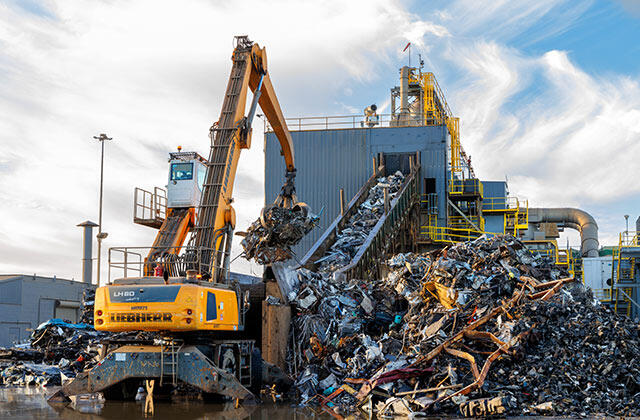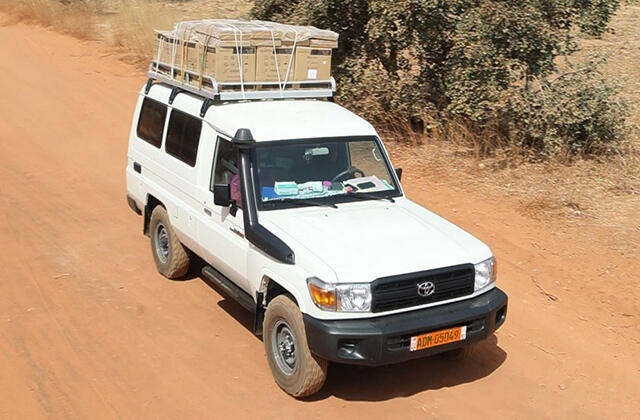The Toyota Tsusho Group's Initiatives for Achieving Carbon Neutrality ~Passing down a better global environment to the children of the future~
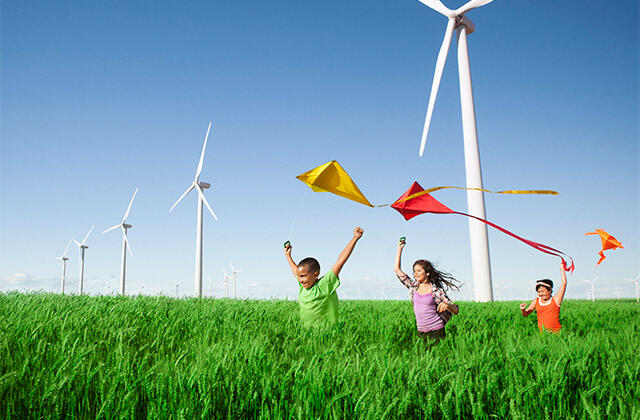
March, 2022
Quickening and Increasing Trend toward Carbon Neutrality and the Environment Surrounding the Toyota Tsusho Group
Having set decarbonization as one of its Key Sustainability Issues (Materiality), the entire Toyota Tsusho Group is promoting the achievement of global carbon neutrality. We participate in initiatives toward realizing a decarbonized society and circular economy, which will lead to carbon neutrality. These are business domains in which the group has long engaged, and we had been working in these areas even before these concepts became widespread.
In the circular economy area, we started the business of recycling end-of-life vehicles (ELVs) in the 1970s, and in the carbon neutrality area, we entered the renewable energy generation business in the 1980s. Particularly in the renewable energy area, we have been one of the largest power generation capacities in Japan through the full acquisition of Eurus Energy and Terra Energy (formerly SB Energy).
Currently, the trend toward carbon neutrality across society is influencing corporate activities as more concrete policies. The EU's decision to implement the Carbon Border Adjustment Mechanism (CBAM) is a system that charges import fees based on CO2 emissions, with full-scale operation planned from 2026. In the United States, the Inflation Reduction Act (IRA) is driving massive investments in the clean energy sector, accelerating the transformation of global industrial structures.
On the other hand, there are indeed various challenges in pursuing carbon neutrality, such as the surge in energy prices and balancing economic growth in emerging countries. However, the importance of addressing climate change is a shared understanding in the international community, and the momentum toward carbon neutrality has become irreversible. Now, responding to carbon neutrality is an essential requirement for the sustainable growth of companies, and delays in addressing it could lead to significant business risks, such as loss of business opportunities and decreased evaluations from investors.
In this context, the Toyota Tsusho Group will leverage the solutions and expertise we have developed to support our customers in achieving carbon neutrality. We are committed to actively working toward the realization of a sustainable society by balancing environmental considerations with business growth.
Greenhouse Gas Emissions Reduction Targets and Future Initiatives
Achieving carbon neutrality in the Toyota Tsusho Group's operations is as essential as contributing to carbon neutrality in society. Therefore, in July 2021 our group set a concrete policy toward contributing to the transition into a decarbonized society. We established a target of reducing greenhouse gas emissions generated through the business activities of Toyota Tsusho and its domestic and overseas consolidated subsidiaries (Scope 1*1 and Scope 2*2) to net-zero to achieve carbon neutrality by 2050. In addition, we also plan to reduce greenhouse gas emissions by 50% below 2019 levels by 2030.
The Toyota Tsusho Group aims to achieve these targets by promoting comprehensive energy conservation and renewable energy measures (installing LED lighting at business offices and plants, installing solar power facilities at company-owned buildings and structures), reducing CO2 emissions from production processes and logistics operations, reducing emissions through technological innovation, and utilizing J-Credits*3 derived from the use of renewable energy.
The ability to accelerate and promote businesses that contribute to the reduction of greenhouse gas emissions throughout the entire industrial lifecycle is a strength of the Toyota Tsusho Group. All employees of our group will unite and work full force to contribute to the resolution of these social issues.
- *1Direct greenhouse gas emissions from Toyota Tsusho's use of fuel, etc. (coal, gas, etc.)
- *2Indirect greenhouse gas emissions from Toyota Tsusho's use of purchased electric power and heat
- *3As a result in 2023, emissions equivalent to 6,274tons of greenhouse gas will be amortized by J-Credits, non-fossil certificates, Green Power Certificates, etc., derived from renewable energy sources.
Reduction Targets
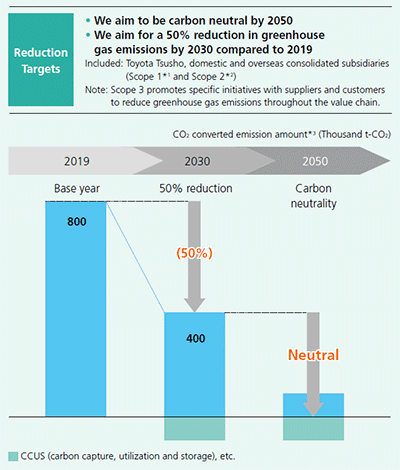
- Carbon neutrality by 2050
- Reduction in greenhouse gas emissions by 50% below 2019 levels by 2030
Scope of application: Parent company and domestic/overseas consolidated subsidiaries (Scope 1 and Scope 2)
- *For Scope 3, we are promoting concrete actions to reduce greenhouse gas emissions in the value chain, in cooperation with our suppliers and customers.
Five Working Groups and the Carbon Neutrality Strategy Map
We have formed working groups in the five domains of our special strengths to robustly facilitate initiatives that lead to carbon neutrality. With these working groups, we engage in businesses that support circular economy at each stage of the industrial life cycle, comprising energy creation, energy collection and coordination, the manufacture, transport, and use of goods, waste treatment, and reuse and recycling. From the fiscal year ending March 31, 2025, as the Phase 2 period, we will endeavor to create the “Toyotsu Carbon Neutrality Ecosystem” by organically coordinating each working group’s functions.
The Toyota Tsusho Group's initiatives for contributing to the transition to a decarbonized society
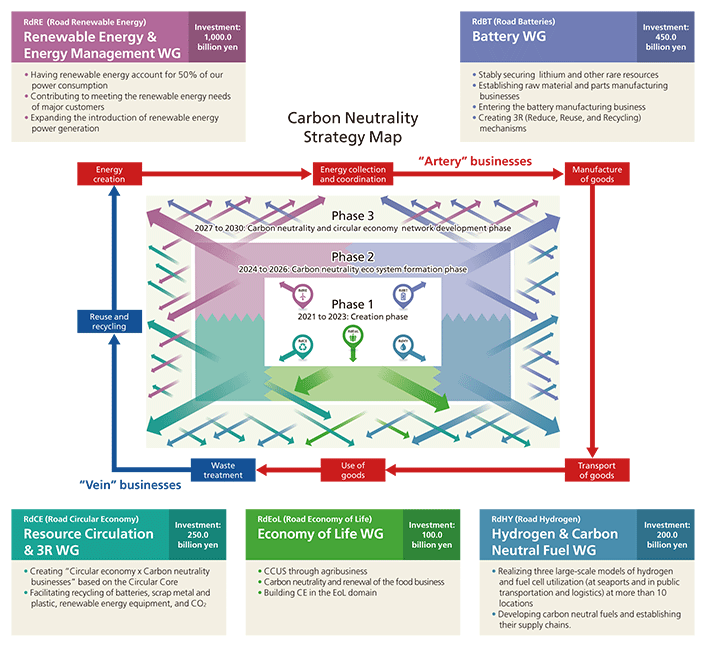
Fives Business Areas with Strengths
To contribute to the transition to a decarbonized society, Toyota Tsusho Corporation is aggressively promoting initiatives that will lead to carbon neutrality by forming working groups within the company, focusing on the five areas in which we can leverage our strength: Renewable Energy & Energy Management*1, Batteries, Hydrogen & Carbon Neutral Fuel, Resource Circulation & 3R*2, and Economy of Life*3
Accordingly, we have updated the Carbon Neutrality Roadmap 2030 that was formulated in November 2021 to further accelerate our initiatives toward achieving carbon neutrality,
In the previous roadmap, Toyota Tsusho announced that it would proceed 1.6 trillion scale investment for the 10-year period from 2021 to 2030 to realize a decarbonized society. In the updated roadmap, we have added 400 billion yen, bringing the total to 2 trillion yen scale investment*4. In particular, 300 billion yen of the additional 400 billion yen will be allocated to the "renewable energy and energy management" area, bringing the total investment to around 1 trillion yen by 2030.
| Focus area | Scale of investment (Announced Nov. 4, 2021) | Scale of investment (Currently announced) | Difference |
|---|---|---|---|
| Renewable Energy & Energy Management |
700 billion yen | 1 trillion yen | +300 billion yen |
| Batteries | 400 billion yen | 450 billion yen | +50 billion yen |
| Hydrogen & Carbon Neutral Fuel | 200 billion yen | 200 billion yen | - |
| Resource Circulation & 3R | 200 billion yen | 250 billion yen | +50 billion yen |
| Economy of Life | 100 billion yen | 100 billion yen | - |
| Total | 1.6 trillion yen | 2 trillion yen | +400 billion yen |
In order to pass down a better global environment to the children of the future, we will expand our businesses that contribute to reducing greenhouse gas emissions by proactively investing in business areas in which we can leverage our strength and formulating and executing specific plans, thereby contributing to the world's transition to a decarbonized society.
- *1Renewable energy & energy management
- *2Rebuild, Reuse, Recycle
- *3Healthcare, foodstuffs, and other businesses that are essential to daily life that enhance the quality of life

Scale of investment : 1,000 billion yen

Scale of investment : 450 billion yen

Scale of investment : 200 billion yen

Scale of investment : 250 billion yen

Scale of investment : 100 billion yen
- Domestic
- Overseas
- NEW









